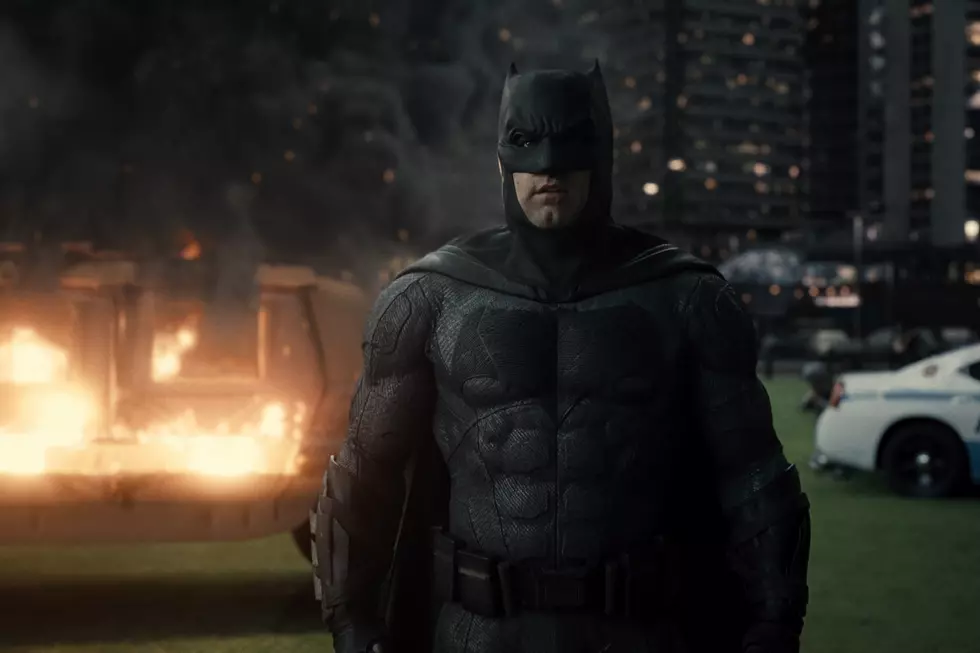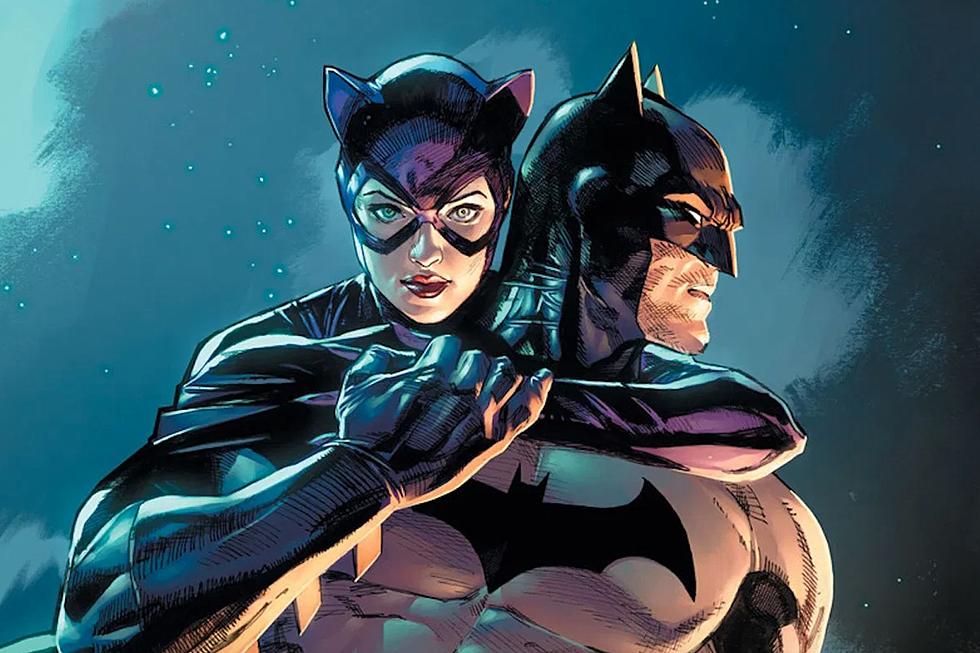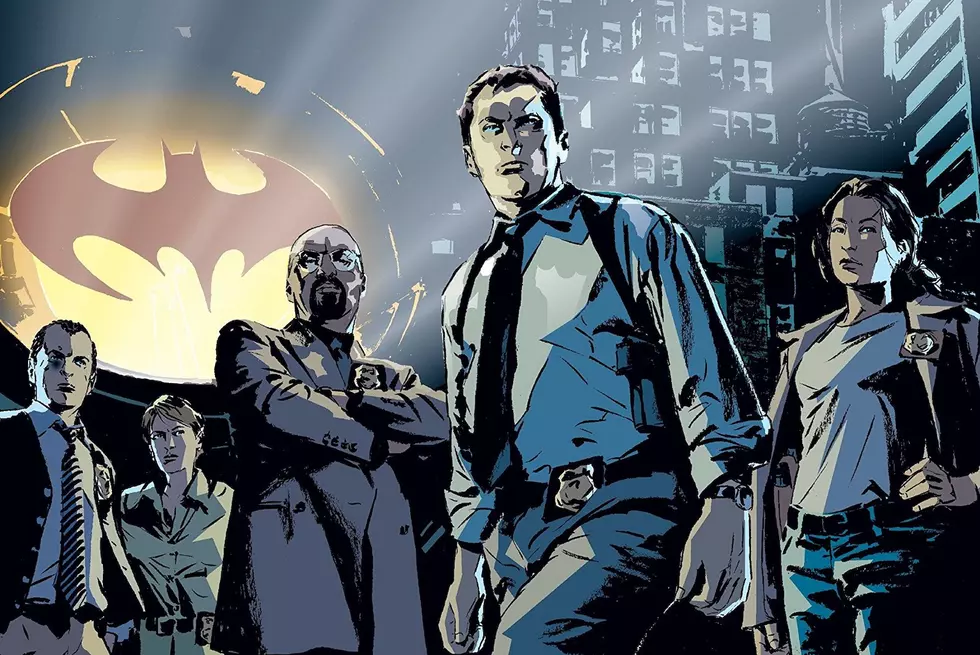
The Batman ’66 Episode Guide 1×32: The Riddler’s False Notion
The 1966 Batman television show was one of the most successful and influential adaptations of comic books to mass media of all time. Over the course of three seasons and 120 episodes, the series became a cultural force with its unique combination of tongue-in-cheek humor, thrilling superhero adventure and celebrity guest stars, and shaped the way the public would view the Caped Crusader for the next five decades. Now, in the midst of a well-deserved renaissance of the show, ComicsAlliance is proud to present The Batman ’66 Episode Guide, an in-depth examination of every single adventure, arch-criminal and deathtrap cliffhanger of the series.
This week, the Riddler finally finishes his silent film... and his true plan is revealed at last!
Batman 1x32: The Riddler's False Notion
Script: Dick Carr
Director: Charles. R. Rondeau
Original Air Date: April 28, 1966
Special Guest Villain: Frank Gorshin as The Riddler
One of the more interesting aspects of the Batman TV show is how it plays with the idea of clichés, and not just the ones that were imported from the comics. Even the structure of the show, the two-part adventures built around deathtraps and cliffhangers, were reacting to stuff like movie serials that had been around for ages --- as much as these first-season episodes were often based directly on issues of the comic, they were almost always self-contained 11-pagers, in a time when multi-part comic book stories were unheard of. And that's what makes "Death In Slow Motion / The Riddler's False Notion" so interesting.
It is, after all, an episode of a TV show built around serial clichés, expanding on a story from the comics, that doubles back to revive those exact setups and presents them as though they're at least nominally a serious threat to our heroes.
Which is exactly how we ended our last episode with Robin strapped to a conveyor belt headed towards a buzzaw while the Riddler twirled a false mustache, with breathless narrator Desmond Doomsday (also known as executive producer William Dozier) assuring us that Batman would not arrive in time.
He's right, too. While Robin is on his way to a... splitting headache, Batman is still dealing with the aftermath of the Riddler dosing Van Jones's Temperance Party with "Temper Tonic," a cocktail that led to a brawl among Gotham's teetotaling elite. Fortunately, Batman was there to solve things with his Universal Drug Antidote.
Either way, the whole thing has left Commissioner Gordon chagrined, leading to a truly amazing exchange about drinking to excess:
COMMISSIONER GORDON: Yes, but still, my unseemly behavior certainly contributed towards Robin's capture!
BATMAN: Let that be a lesson: In the future, be more careful from whom you accept free lemonade!
Good advice, but it's interrupted by a rocket launched from the Batmobile's distinctive exhaust pipes, containing two more riddles:
- Why is a bear like a fallen tree?
- Why is silk like grass?
The answers, of course, are that bears and trees both lumber, and silk and grass are both measured by the yard, a bit of grade-school deduction that leads Batman to the Gotham City Lumber Yard and its conveyor-fed buzzsaw.
I have some pretty distinct memories of this next scene from when I was watching the show every day as a kid, and while those memories did not include the Riddler going full Snidely Whiplash...
... they definitely included a pretty vivid memory of Robin's head going right into the buzzsaw. especially since Batman's just kind of standing around trading quips with the Riddler as Robin's head gets ever closer to and, thanks to some forced perspective camera work, right into the spinning blade.
It's the kind of thing that'll terrify you into not remembering that the control switch for the conveyor belt is set to "REAL FAST." Best set designers in television history, y'all.
In either case, the Boy Wonder is not split in two here. As indicated by the Riddler's clue, "When is a man a stupid relative," the sidekick on the belt is actually a mannequin (oof). The real Robin is stashed somewhere else, and with no further leads, Batman turns to the Riddler's henchwoman, Pauline.
You know, as in "Perils Of." I literally just got that.
It might not be surprising given how everything on the show is Dutch angled and pop-art neon, but the script here goes way over the top in showcasing Batman's concern for Robin. There's actually a level where it's kind of nice, looking back from an era that has largely been defined by stories where Grumpy Batman Can't Express His Feelings, but West's portrayal here goes from zero to 100 as soon as he sees that buzzsaw split the mannequin's scalp.
There are a few times when he actually comes close to a very modern-age portrayal of being driven over the edge by the possibility of Robin's death, first when he arrests Pauline --- "Give yourself up, or by all that's holy I might forget myself and do you violence!" and then again when he takes her back to the police station for an interrogation. He tells Gordon that to get the answers, he needs to take her back to the Batcave, and brings him along as insurance. "When it's a question of Robin's safety," he tells Gordon, "I don't entirely trust myself. I'd like a witness present to make sure I don't employ methods which might bounce back on me in court."
Yikes.
A whiff of Batgas later, Gordon and Pauline are both in the Batcave, and Batman goes to work with a strange form of interrogation. He basically just wakes her up, speaks to her in a hypnotic monotone while she has a bag over her mouth so that he can analyze her breath, and tell whether she's lying by the oxygen content within.
He lays it on pretty thick, too, informing her that they're "deep within the entrails of the Earth, Pauline, where every instrument has been designed to combat crime," and Gordon pushes it over the top by claiming that "there are those who came to this Batcave and never left." Then, once it's all over, he says that he'd swear in court that there was no undue coercion to the information that they get, which... Man, forget Warden Crichton's prison policies, I'm starting to think that the entire Gotham City justice system needs an overhaul.
As for the information itself, it comes in the form of --- you guessed it --- two more riddles:
- Why was Flo Ziegfeld like a nearsighted man?
- What kind of men are always above baord?
The answers --- they both put on spectacles, and chessmen, respectively --- points to the Chessman building and its dangerously high ledges, where the Riddler is currently engaged in a sinister parody of Harold Lloyd --- a performer known for both is amazing stunts and his trademark spectacles.
ROBIN: You lowdown fiend! What's the point of all this?!
RIDDLER: Comedy, Boy Wonder. Lighthearted comedy to accommodate a connoisseur!
Robin, who I will remind you was a circus acrobat before he became a vigilante --- although that's a piece of his origin that never comes up on the show --- is terrified of the dangerous height, and with good reason. The Riddler's going to push him to his death, and with his hands tied, there's not a lot he can do about it.
Unless, of course, he catches Batman's batarang in his teeth!
Yes, the Caped Crusader arrives in the nick of time, and thanks to the Boy Wonder's attention to dental hygiene, a tragedy is averted. Unfortunately, the Riddler gets away via helicopter, and once again, we're left with two more riddles:
- What kind of machine has ears?
- Why does a cowboy wear a tight belt?
These are easy ones: A train has engineers, and a cowboy wears a belt to hold his pants up. Put them together, and Robin leaps to the conclusion that the Riddler's target is the El Chief, a train favored by silent movie stars. But when you're dealing with the Riddler, there's always a double meaning, and in this case, it's an obvious one.
At Van Jones's mansion, the Riddler arrives to present him with the final cut of his silent movie, the one he was paid a grand sum of $100,000 to film, and he does it in a full cowboy outfit while affecting a southern accent:
Jones, the amoral collector that he is, has commissioned the film as a one-of-a-kind collector's item to compliment the ones he already has in his burglar proof vault --- including a priceless copy of The Great Train Holdup, the '66 universe's version of 1903's Great Train Robbery. And that, it turns out, is the Riddler's true target.
His vault is so expertly crafted that, unless one employed some kind of universal solvent wax, it can only be opened by Van Jones himself, and when he does just that in order to stash the Riddler's film, the Prince of Puzzles whips out his six-shooter for a holdup of his own. Van Jones then becomes like a clock at midnight --- "because both of your hands are goin' straight up!"
Fortunately for Van Jones's collection --- and unfortunately for the man himself, since he's been bankrolling illegal activities including at least one attempted murder --- Batman sussed out the true meaning of the clue, arriving just in time for a dramatic entrance and a climactic fight scene.
With that done, the Riddler is taken into custody and the adventure comes to a close, but not before there's one last bit of business.
It seems that April 28 marked the birthday for one Mrs. Harriet Cooper, and Bruce and Dick promised her a big surprise that arrives in the form of Batman and Robin, wishing the delightful lady a very Happy Birthday!
Awwww!
Index of Episode 1x32:
Bat-Gadgets:
- Universal Drug Antidote
- Batgas
- Batwake
- Truth Control Bat-Tester
More From ComicsAlliance








![Friendly, Wholesome, And Tough: David Hahn And Karl Kesel On The Art Of ‘Batman ’66 Meets Wonder Woman ’77’ [Interview / Preview]](http://townsquare.media/site/622/files/2017/01/B66a.jpg?w=980&q=75)
